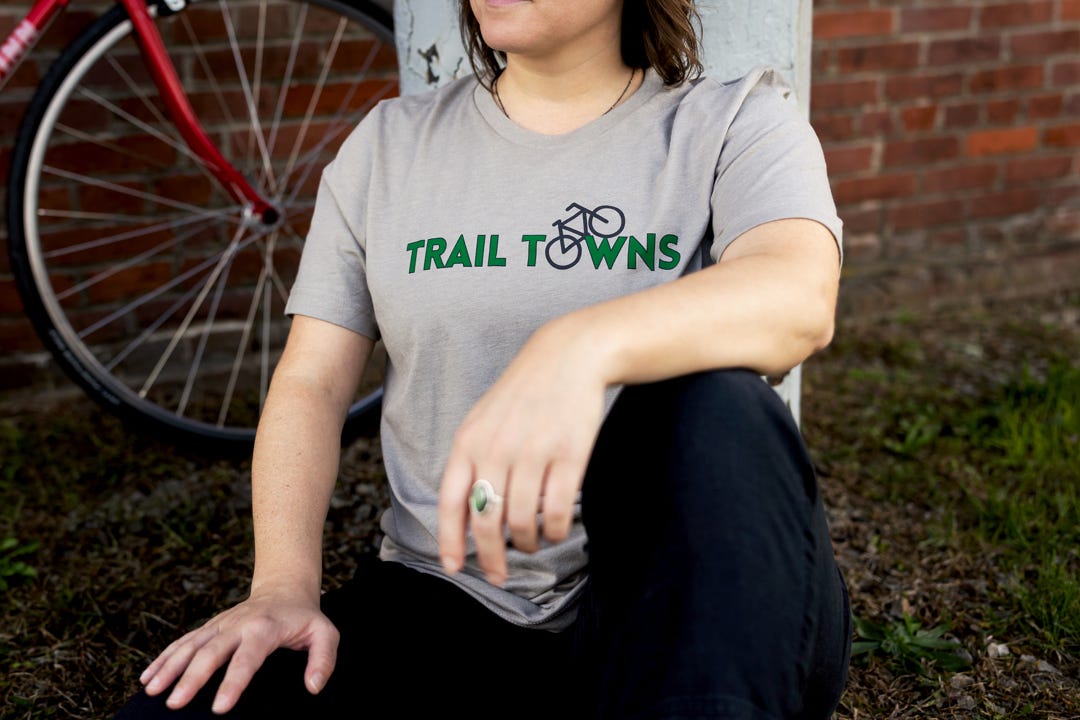Questions People Ask Me About Trail Towns (Part 1)
Plus new Trail Town tees and a final call for the Trail Towns 101 course
I’m passionate about the Trail Town model and have devoted the last 18 years of my life to the topic. Wow, writing that is really kind of staggering to me! It’s more than just work for me. I feel deeply devoted to helping communities, trail managers, and entire regions figure out how to create stronger, more meaningful connections between trails and communities.
I’ve probably given hundreds of presentations on the topic, and with each new presentation some people in the audience are hearing about “Trail Towns” for the very first time. One such instance at the 2023 International Trails Summit inspired me to try to answer some of the FAQs. Nearly all of these topics are addressed in my book, Deciding on Trails: 7 Practices of Healthy Trail Towns, but my thinking continues to evolve, so there are also some new ideas and resources tucked into this post.
So, please keep reading for the first question and click through to the full article if you want to know more about Trail Towns!
What does it mean to be a Trail Town?
This is the most basic question I’ve been asked over the years. I think of it in two ways.
1. First, there are communities that are part of organized Trail Town and Gateway Community initiatives that aim to help communities improve their connections to trails. I think of it as a form of regional community development. It’s about leveraging trails for the good of communities located alongside them. There are about two dozen organized Trail Town and Gateway Community initiatives throughout the U.S. and Canada. Most programs are organized around a single trail or trail network and unite communities around their shared asset – the trail(s). Often, communities seek Trail Town or Gateway Community designation, are expected to uphold the designation, and enjoy the benefits of being associated with the trail.
2. In addition to organized programs, there’s another way to think about what it means to be a Trail Town. It’s a mindset. Even without a program, communities can act, look, and feel like Trail Towns by investing in trails and finding ways to connect to them. Trail Towns embrace and celebrate trails and outdoor recreation. They are trail-oriented, provide services to trail users, and there’s a trail-friendly culture that exists throughout the community. If you have a copy of Deciding on Trails, see p. 10 for an extended definition of Trail Towns and see Chapter 9 for more on trail culture. As I’ve said many times, it’s a culture of trails that ultimately upholds the trail economy that you may desire for your community.
Please remember that without a formal program in place in your area, you can – and should – think of your community as a Trail Town in an informal sense. It's a mindset and a decision to embrace and invest in trails.
If you found this to be helpful, see the full article for the answers to more questions, including:
Who manages and oversees the Trail Town approach?
What kinds of trails are best suited for a Trail Town initiative?
Is my community the right size for Trail Towns?
Is my community close enough to the trail to be considered a Trail Town?
What trail communities have you seen that provide the best examples of being a Trail Town?
Let me know in the comments what questions you hope to see addressed in Part 2 of this series!
Tree Town Tees Available!
Did you know that Cycle Forward is selling Trail Town tees? Use the discount code TrailTown to save 10% on t-shirts and books.
Last Call for February 101 Course Registrations
This has been a long time coming, but the Trail Towns 101 course begins in less than two weeks! I'm so excited to partner with Michele Archie of The Harbinger Consultancy to offer this first-time Trail Town training. We are offering three 2-hour live video conference sessions (Feb. 4, 11, and 18) plus one-on-one coaching. Trail Towns 101 will help you take the next steps toward unlocking the full potential of your local trails. Use the discount code CycleForward for 10% off the cost of the course.






Really fascinating information, Amy! And the tee shirts look awesome -- Love the design!